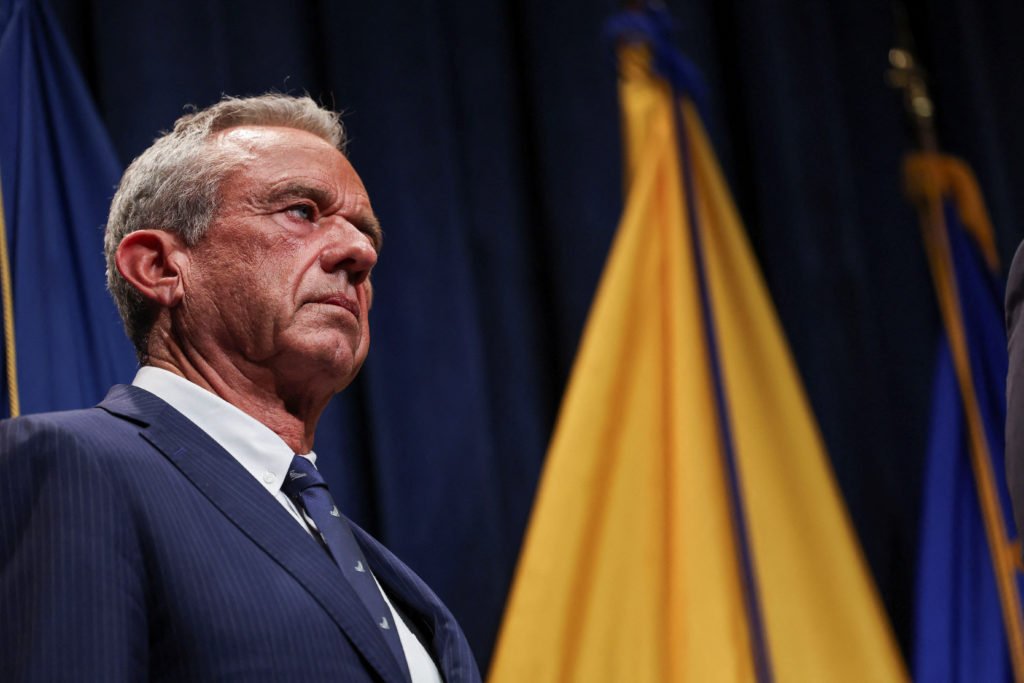The Trump administration released its latest report Tuesday on how to “Make America Healthy Again,” the second installment of Health Secretary Robert F. Kennedy, Jr.’s strategy to combat chronic disease among children. While this report amplified calls to address long-standing environmental and behavioral practices that harm kids, experts said it was slim on details about how to turn policy priorities into regulatory action. They also worried about a disconnect between what this report says and how the Trump administration has unraveled research that would address these issues.
Since the Senate confirmed him in February, Kennedy has promoted the concept and use of what he calls “gold-standard science” to expose the causes of child health outcomes, a phrase he repeated today when speaking about how the commission behind the report would proceed with development rules and recommendations.
But health and environmental experts who spoke to PBS News said his actions speak louder than words; research has shown that actions like the administration’s push to shred health and environmental regulations could contribute to worsening, not improving, the outcomes and wellbeing of children.
“Secretary Kennedy has correctly identified chronic disease as a major driver of poor health and high healthcare costs,” said Dr. Richard Besser, president and CEO of the Robert Wood Johnson Foundation and a former director of the Centers for Disease Control and Prevention, in a written statement. “But neither his record as health secretary nor most of the policies outlined in this report inspire confidence that he is the right person to solve this problem.”
The much-anticipated report was brief, fewer than 20 written pages filled with bullet points highlighting several policy priorities that Kennedy and the Trump administration have already touted or acted on in recent months.
“A lot of these 128 recommendations are things I’ve been dreaming about my whole life,” Kennedy said Tuesday at a press conference.
Marc Weisskopf, a professor of environmental epidemiology and physiology at the Harvard Chan School of Public Health, told PBS News that he was particularly heartened to see that the Trump administration says it is paying attention to the role that a lack of physical activity, access to nutritious foods and environmental factors can shape children’s health outcomes.
But he also pointed to the disconnect between what this report says and how the Trump administration has unraveled research to better understand these issues and regulations designed to address them.
If the goal is to deliver “gold-standard science” and to protect children’s health, Weisskopf said, “We need people who are knowledgeable about this work to be around the table.”
Here’s a look at some of the issues the latest report seeks to address, and some important factors experts say were overlooked:
Targeting poor diet, additives and fluoride
In the same report where the administration slammed lax standards on food and linked them to deteriorated health outcomes, the Trump administration called for deregulation of agriculture and food.
Emphasizing the need for revamped dietary guidelines, the report called for changes in committees and task forces that advise the federal government about these standards. The report slammed the availability of “ultra-processed foods” and the use of artificial food dyes, building on Kennedy’s previously announced plans to phase out certain dyes in April. The administration pledged to increase testing for heavy metals like lead in infant formula, and look for ways to boost breastfeeding rates nationwide.
The report also re-upped Kennedy’s campaign against fluoride, stating that the CDC would update recommendations for fluoride and PFAS in drinking water. Public health experts have celebrated fluoride as one of the great innovations in cavity prevention and improved dental health.
The National Institutes of Health will link health insurance claims information, patient electronic health records and multiple datasets to create a Real World Data Platform, the report said. This move has raised concerns among critics about patient privacy concerns and the unintended use of data.
The Trump administration’s recent actions, particularly in its push to slash federal funding in research grants that have been instrumental in producing answers to complex questions about children’s wellbeing, may undermine the vision laid out in this report for a healthier nation, Weisskopf said: “Cutting NIH severely would directly work against everything that document purports to want to do.”
No guidance on the leading cause of death among children: guns
One notable absence in the report was any mention of how gun violence and firearms, the leading cause of death among U.S. teens and children, affect children’s health.
The American Academy of Pediatrics praised what its president and CEO, Dr. Susan Kressly, called “opportunities to add pediatric expertise and research to help guide actions toward meaningful and sustainable improvements in child health” after the report was released. But Kressly said the report needed to be more comprehensive to fully recognize the complicated web of risks that endanger and kill children in this country.
“Although the report touches on some of these areas, it lacks details on how the Administration plans to address those issues and omits key drivers that harm children’s health, including gun violence and environmental hazards,” Kressly said in a written statement.
When PBS New Hour’s Lisa Desjardins asked Kennedy about the absence of gun violence and children in this report, he said “we’re doing research” and pointed out that “this is not happening in other countries.”
’Overmedicalization’ and chemical exposure
Authors of the report referenced the importance of developing a vaccine framework capable of “ensuring America has the best childhood vaccine schedule,” while also “addressing vaccine injuries” and conflicts of interest while promoting “scientific and medical freedom.”
Weisskopf said he was concerned about how that freedom will be exercised by parents under the current administration. He added that he hopes that the Trump administration will welcome experts who have studied the factors that shape children’s health for their entire careers to help unravel these complicated issues together.
But as Kennedy has reshaped the health agencies he oversees, he has given many vaccine advocates cause for concern. In June, he fired the entire committee that advises the Centers for Disease Control and Prevention on immunization practices. Since then, he has handpicked people to join the panel, and his choices reveal a preference for anti-vaccine advocates and conspiracy theorists. Kennedy also fired CDC Director Susan Monarez a month after she took the role in a reported dispute over vaccine policy.
The report’s authors also raised that concern about the “cumulative risks” of chemical exposure to pesticides and how these chemicals could contaminate the food supply and harm people’s health. But Lori Ann Burd, environmental health director at the Center for Biological Diversity, issued a statement criticizing the report because it “eliminated any plans for action on pesticides.” In a written statement, Burd says the report amounts to the Environmental Protection Agency teaming up with the agricultural industry with the hope of “convincing Americans that our pesticide regulatory process is robust.”
“If the EPA wants to convince us that our pesticide regulatory process is robust, they should make it robust,” Burd said.




